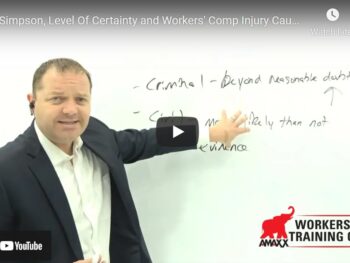There is never a requirement under a workers’ compensation act that an injured worker retain legal representation. While more injured parties seek legal representation at some point during the life of a claim, the pro se litigant can cause a special series of problems.
What does it mean to be Pro Se?
The term “pro se” is comes from the Latin phrase, which means “for oneself.” This term was later adopted in the English common law and associated with a litigant who represented them self in a legal proceeding.
Self-Representation in Workers’ Compensation
In workers’ compensation cases, parties will often not be represented by an attorney at the onset of a claim. Due to the legal complexities of workers’ compensation cases, a vast majority of disputed cases result in the claimant obtaining legal representation. This includes professional assistance to navigate the rough waters of litigation and advise the claimant regarding settlement or resolution of their claims.
Click Link to Access Free PDF Download
“Avoid the 3 Primary Reasons Injured Workers’ Hire Attorneys”
The Double-Edged Sword of Claimant Representation
Members of the claim management team, defense attorneys and employer representatives should always treat the injured worker with dignity and respect in all circumstances. In many instances, the interested stakeholders on the defense side should go the extra mile to avoid conflict, which results in the claimant obtaining legal representation. On the other hand, competent counsel for the injured worker is not always bad. Unrepresented parties will not typically understand the workers’ compensation benefit structure. This can result in frustration and delay for all parties.
Treat Unrepresented Employee With Dignity & Respect
The unrepresented workers’ compensation litigant will likely have no prior legal training or background. This can result in delays in settlement and cause confusion later on. When dealing with the unrepresented, it is important to do the following:
- Provide a disclaimer that the claim management team and/or defense attorney is NOT their legal representative. The consequence is they cannot provide legal advice to the worker, nor can they provide instruction on future actions that impact entitlement to benefits;
- Continue to treat the unrepresented employee with dignity and respect. This includes all written and verbal communications; and
- Instruct the injured worker to have their attorney contact the claims management team and/or defense attorney if they change their mind and obtain legal counsel.
Reaching Settlement with the Unrepresented Claimant
Settling workers’ compensation cases with can be difficult. While all litigants are held to the same standard as an attorney practicing workers’ compensation law, state industrial commissions and compensation judges will take extra steps to ensure the integrity of the law is upheld and the pro se litigant understands fully the settlement agreement. Parties drafting such settlement agreements may want to consider adding certain questions to the document to impress upon the employee and the courts the settlement was taken seriously. Here are some examples to include:
ANSWER INITIALS
- Have you read the entire Stipulation? _____ _____
- Do you acknowledge that you have been provided
with the opportunity to be represented by your own
attorney, and that it is your own choice to have or not
have legal counsel review this Stipulation for
Settlement? _____ _____
- Do you acknowledge that, by executing this
Stipulation for Settlement without legal counsel,
you agree to waive voluntarily your right to legal
counsel? _____ _____
Having the employee answer the question yes/no and initial the answer adds to the steps one might want to consider.
Conclusions
In some instances, a pro se litigant can be a challenge to interested defense stakeholders. This will require those parties to take extra steps to ensure the integrity of the workers’ compensation act and protecting a settlement against future judicial scrutiny.






















